Words of Wisdom - Shastra
& Shastrakaras speak
For Books and shastra downloads see Main Index, under
Books:
Om Namo Bhagavate Vasudevaya
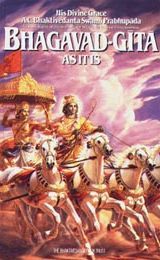

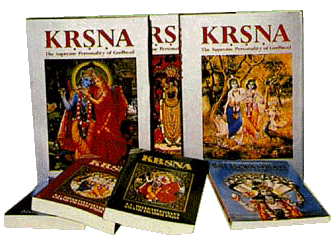
The Complete Works of Srila Prabhupada
All the books, the letters and conversations at your
fingertips

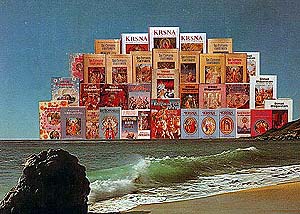
All Srila Prabhupada's books and more on one disk
http://www.vedabase.com




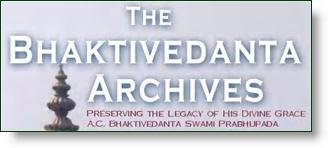
Srila Prabhupada's Audio lectures to listen to on-line:
http://www.hare-krishna.org/srila-prabhupada-lectures.htm
Listen to Srila A.C. Bhaktivedanta Swami Prabhupada on-line
- all 900 of his lectures are available HERE:
http://www.prabhupadavani.org/
Srimad Bhagavatam - the entire lecture series listen and
read along on-line - Narrated by Amala Bhakta dasa:
http://www.prabhupadavani.org/SB_index.html
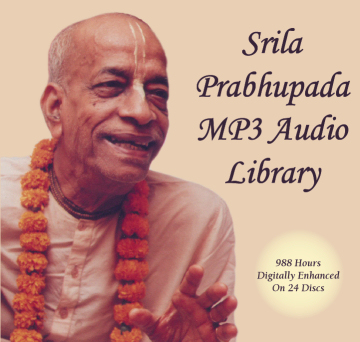
The new enhanced Prabhupada MP3 series
http://www.prabhupada.com/store/store.php?page=product.php&id=MP3AUDIOLIB

The Audio Srila Prabhupada Lilamrita
Please find enclosed details a being launched on Gaura Purnima day 2008.
It is a simple audio rendition of sections from "Prabhupada,
your ever well-wisher" by Satsvarupa dasa Goswami.
It was recorded here in the UK back in the mid '90's
by Bhagavat-Asraya prabhu (ACBSP) at my studio and I edited it into 8 short
instalments for inclusion on my weekly radio programme "Nectar of Devotion".
We had such a good response from listeners that it was
decided to add "The Audio Srila Prabhupada Lilamrita" to the Nectar of
Devotion website archive page.
In doing so I felt it might be nice to create a very simple,
seperate website for the Lilamrita.
The result is http://www.lilamrita.page.tl
It will be officially launched on Gaura Purnima day 2008
for the pleasure of Srila Prabhupada and all the Vaishnava's.
I hope this humble attempt will add to the growing appreciation
of Srila Prabhupada's remarkable achievements.
If other Krishna conscious radio stations would like
to broadcast this Lilamrita series they can contact me at devotion@nusoundradio.com
and I can send them mp3 copies.

Srila Prabhupada Vyasa-puja book 2007
http://www.krishna.com/node/1048
Vyasa-puja is an annual celebration by the devotees of Lord Krishna
to offer homage to their guru, or spiritual teacher.
There are two versions of the Vyasa Puja Book based on the speed of
your internet connection.
If you are unable to open the file, download Acrobat Reader.
High speed connections, with pictures.
Vyasa-puja
Book 2007 [PDF/ZIP, 2.11MB]
Low speed connections, no pictures.
Vyasa-puja
Book 2007 (no pictures) [PDF/ZIP, 2.11MB]








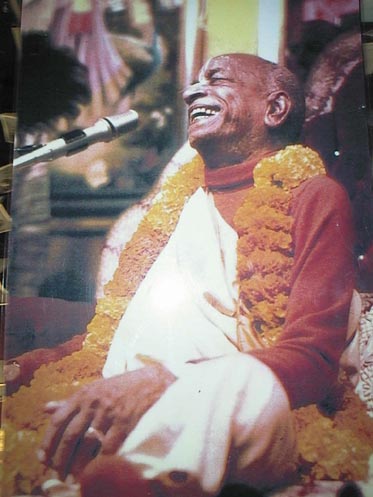
Visit "Prabhupada Connect" for all manner of Prabhupad
Nectar:
http://www.prabhupadaconnect.com/Index.html
Srila Prabhupada's Final Lesson Video - Downloadable and
viewing on-line
http://users.iskconludhiana.com/images/thumbnails.php?album=21
All pictures of Srila Prabhupad (19, 494)
http://www.iskconmedia.com/photos/Prabhupada_All_Photos/


All Srila Prabhupada's original books
available for sale here.

Download all the Hare Krsna teachings which includes
all Vaisnava and
Vedic concepts by visiting one of the sites listed at
the following address.
http://www.geocities.com/suci123/bookdownloadsites1.html
The Bhaktivedanta Book Trust
Srila Prabhupad Memorial Library
http://www.krishna.com/main.php?id=33


33 Books Online Including Srimad Bhagavatam!
http://www.geocities.com/freeprabhupadabooks
The compressed "self extracting" file mentioned is now currently
available for download
http://www.krsnaconsciousness.org/Gauranga/Folio/BhaktivedantaVedabase_DOS.exe

Download or Listen to Prabhupad Bhajans HERE:
http://www.prabhupadavani.org/web/text/Bhajans.html


On-line 1972 McMillan edition - Bhagavad Gita As It Is:
http://www.asitis.com/

Bhagavad Gita AS IT IS on-line through the Tirupathi
Balaji site:
http://www.bhagavad-gita.us/

Bhagavad Gita Study guide on-line book:
http://chantandbehappy.com/gita/studyguide/StudyGuide-main.htm
Bhagavad Gita Study guides by numerous Iskcon devotees
- FREE downloads:
http://www.veda.harekrsna.cz/library/#3

All the Scriptures you'd ever need 4 FREE
http://www.hknet.org.nz/index-books.htm
http://www.hknet.org.nz/DDB.htm
http://www.hknet.org.nz/DDB2.html
last updated 4th August 2003


Srimad Bhagavad Gita AS
IT IS
Bhagavad Gita: Chapter
7 - Knowledge of the Absolute
TEXT 9
punyo gandhah prthivyam ca
tejas casmi vibhavasau
jivanam sarva-bhutesu
tapas casmi tapasvisu
WORD FOR WORD
punyah--original; gandhah--fragrance; prthivyam--in the
earth; ca--also; tejah--heat; ca--also; asmi--I am; vibhavasau--in the
fire; jivanam--life; sarva--in all; bhutesu--living entities; tapah--penance;
ca--also; asmi--I am; tapasvisu--in those who practice penance.
TRANSLATION
I am the original fragrance of the earth, and I am the
heat in fire. I am the life of all that lives, and I am the penances of
all ascetics.
PURPORT by HDG Srila A.C. Bhaktivedanta Swami Prabhupada:
Punya means that which is not decomposed; punya is original.
Everything in the material world has a certain flavor or fragrance, as
the flavor and fragrance in a flower, or in the earth, in water, in fire,
in air, etc. The uncontaminated flavor, the original flavor, which permeates
everything, is Krsna. Similarly, everything has a particular original taste,
and this taste can be changed by the mixture of chemicals. So everything
original has some smell, some fragrance, and some taste. Vibhavasu means
fire. Without fire we cannot run factories, we cannot cook, etc., and that
fire is Krsna. The heat in the fire is Krsna. According to Vedic medicine,
indigestion is due to a low temperature in the belly. So even for digestion
fire is needed. In Krsna consciousness we become aware that earth, water,
fire, air and every active principle, all chemicals and all material elements
are due to Krsna. The duration of man's life is also due to Krsna. Therefore
by the grace of Krsna, man can prolong his life or diminish it. So
Krsna consciousness is active in every sphere.
- His Divine Grace A.C. Bhaktivedanta Swami Prabhupada
Copyright 1983 The Bhaktivedanta Book Trust International. Used with
permission.

Bhagavad Gita As It Is - http://www.asitis.com/
Bhaktivedanta Vedabase - Bhagavad Gita on-line http://bhagavadgitaasitis.com/
Bhaktivedanta VedaBase: Bhagavad-gita As It Is http://vedabase.net/bg/en
Bhagavad Gita Multi Media Web-version http://chantandbehappy.com/gita/
Listen to Bhagavad Gita on line - http://www.Gitamrta.org
View our Bhagavad Gita Overview:
http://www.hknet.org.nz/BG.html
Archive: http://www.cs.rice.edu/~vivek/btg/archive/
Home Page: http://www.cs.rice.edu/~vivek/btg/
Join Bhagavad Gita eGroups HERE
mailto:bhagavad_gita-owner@egroups.com


Prabhupada Uvacha:
(here's some nectar, sometimes it comes in the form of Srutakirti prabhu's
diary, other times from Govinda dasi's diary, Hari Sauri prabhu's Transcendental
Diary, Bhurijan prabhu's book, or sometimes from a letter, or other related
source, but still nectar...)
All ashrams are needed
Srila Prabhupada returned by 7:30 a.m. and entered
the ground floor of the house for a short morning program. The downstairs
consists mainly of a hallway, guest bedroom, pantry, kitchen, a large living
room with an adjoining dining area. The devotees have put Srila Prabhupada's
vyasasana, which is usually kept upstairs, in the dining room and a simple
Pancatattva altar faces it from the opposite end of the living room. The
yatra here may be small but is certainly not poor. The floor coverings
in the living room are Persian Kashan carpets of navy blue and red floral
design worth about $12,000 each.
Srila Prabhupada mounted his vyasasana -- a converted
armchair covered with an orange brocade sari -- to receive guru-puja from
the enthusiastic devotees. Then at the end of the kirtana we all sat on
the opulent rugs eager to hear his lecture.
It turned out to be very short, hardly one minute,
on Srimad-Bhagavatam 3.22.19. Prabhupada had Pradyumna prabhu read out
the Sanskrit verse, the word-for-word transliterations, and translation.
It described Kardama Muni's desire to marry, have a child, and then retire
from family life. Pradyumna read the purport, which was exceptionally interesting:
"According to Vedic principles, the first part of life should be utilized
in brahmacarya for the development of character and spiritual qualities.
In the next part of life, one may accept a wife and beget children, but
one should not beget children like cats and dogs.
"Kardama Muni desired to beget a child who would
be a ray of the Supreme Personality of Godhead. One should beget a child
who can perform the duties of Visnu, otherwise there is no need to produce
children. There are two kinds of children born of good fathers: one is
educated in Krsna consciousness so that he can be delivered from the clutches
of maya in that very life, and the other is a ray of the Supreme Personality
of Godhead and teaches the world the ultimate goal of life. As will be
described in later chapters, Kardama Muni begot such a child-Kapila, the
incarnation of the Personality of Godhead who enunciated the philosophy
of Sankhya. Great householders pray to God to send His representative so
that there may be an auspicious movement in human society. This is one
reason to beget a child. Another reason is that a highly enlightened parent
can train a child in Krsna consciousness so that the child will not have
to come back again to this miserable world....
"In the same order as Kardama Muni, about 100
years ago, Thakura Bhaktivinoda also wanted to beget a child who could
preach the philosophy and teachings of Lord Caitanya to the fullest extent.
By his prayers to the Lord he had as his child Bhaktisiddhanta Sarasvati
Gosvami Maharaja, who at the present moment is preaching the philosophy
of Lord Caitanya throughout the entire world through his bona fide disciples."
Srila Prabhupada's few added comments were highly
relevant to this small community of householders. "So householder life
is not condemned; it is required. If there is no householders, then wherefrom
the saintly persons will come? They will not drop from the sky. So everything
is required. In our society, we have got householders, we have got brahmacaris,
we have got sannyasis. So Krsna consciousness movement is a very scientific
movement for the total benefit of human society. If it is properly carried
out, then everyone will be satisfied and happy and go back home, back to
Godhead. Thank you."
- From "A Transcendental Diary Vol 4" by HG Hari
Sauri Prabhu
To receive little snippets of nectar like this on a daily basis subscribe
HERE: or If you want to introduce anyone else in reading Srila Prabhupada
Nectars, please send their eMail addresses to mailto:krpamaya_gauranga@hotmail.com
Please Chant:
 Hare
Krishna Hare Krishna Krishna Krishna Hare Hare
Hare
Krishna Hare Krishna Krishna Krishna Hare Hare
 Hare
Rama Hare Rama Rama Rama Hare Hare
Hare
Rama Hare Rama Rama Rama Hare Hare
...................and be Happy

Listen to Srila Prabhupad on-line
....a different lecture, morning walk, conversation or
class daily.
"'Classless' Means Fools--Rascals--Sudras"
Srimad-Bhagavatam 5.5.17
Vrndavana, November 5, 1976
Listen to the entire lecture on-line:
http://prabhupadaradio.com/M3U/Bhagavatam/m3u_II/SB433.m3u
Pradyumna: "If someone is ignorant and addicted to the
path of samsara, how can one who is actually learned, merciful and advanced
in spiritual knowledge engage him in fruitive activity and thus further
entangle him in material existence? If a blind man is walking down the
wrong path, how can a gentleman allow him to continue on his way to danger?
How can he approve this method? No wise or kind man can allow this."
Prabhupada:
kas tam svayam tad-abhijno vipascid
avidyayam antare vartamanam
drstva punas tam saghrnah kubuddhim
prayojayed utpathagam yathandham
[SB 5.5.17]
So one person is utpathagam yathandham, another person
is vipascid tad-abhijnah. Two classes of men generally: one who knows the
things as they are and one who does not know what is the value of life,
how to make progress. So one does not know and one knows. So naturally
there must be two classes of men to make real social progress or any, anything.
Actually we see that there are a class of men in the school, colleges,
universities, who can teach, and class of men who are taught. So without
these two classes of men, how society can make progress? But the modern
theory is "classless society." Modern rascal theory is classless society:
"There is no need of teacher, or there is no need of higher class, or there
is no need of... One class." Therefore they fall down. Even in socialistic
country like Russia, first of all they wanted to make classless society.
Later on they have made a manager class and worker class, because this
is not possible.
If you want to manage things, there must be two classes
of men, and two classes can be divided into so many other classes. Therefore
the intelligent way of civilization is described in the Bhagavad-gita,
catur-varnyam maya-srstam guna-karma-vibhagasah [Bg. 4.13]. There must
be four classes. In order to manage things very nicely, you cannot make
classless society. Four classes. The most intelligent class, brahmana,
and then next intelligent, the ksatriyas, and the next intelligent, the
vaisyas, and the last one, who has no intelligence, sudra. These four classes
must be there. Without this division of classes, society, who will guide
them? At the present moment, without any class the government has made
adult vote. Anyone who is above certain age, say eighteen years or twenty
years, he can vote. But there is no class, that "This class can vote; this
class cannot vote." There is no such thing. Anyone who is above eighteen
years old, he is competent to cast his vote. And people are not educated
in this division, brahmana, ksatriya, vaisya, sudra. They are all classless.
Classless means fools, rascals, sudra. If you classify...
Classify means "Here is intelligent class, here is next class, here is
next." If you don't classify, that means sudras. So sudras, they have got
votes. Similarly, what they will elect? They will elect another rascal,
that's all. Big rascal. A small rascal and big rascal, that's all. Therefore
in the Bhagavata it is said, sva-vid-varahostra-kharaih samstutah purusah
pasuh [SB 2.3.19]. Here is our president. Here is our prime minister. But
what is he? He is elected by the sudras, so he is a big sudra, that's all.
How you can expect nice things? If you say, "Now he is elected President,
he is so much honored and he's exalted post, His Excellency," so Bhagavata
says, "Yes. This is all good, but by whom he is praised?" Sva-vid-varahostra-kharaih
samstutah purusah pasuh. Just like lion. Lion is very strong animal. He
is considered to be the king of the forest. So all other small animals,
they are very much afraid of, very respectful. But does it mean because
he is lion he is not an animal? He is animal. He may be lion, very powerful,
very strong, he can subdue others. But that does not mean he is any advanced
intelligent person like brahmana or ksatriya. This is going on. The Bhagavata
therefore says, sva-vid-varahostra-kharaih samstutah purusah pasuh. The
next line I just forget.
So anyone, if he is not Krsna conscious, he is a pasuh,
animal. Because human life is meant for that purpose. Tapo divyam putraka
yena suddhyet sattva [SB 5.5.1]. Otherwise he is animal. So this is going
on at the present moment, that some small animal accepting one big animal
as leader. So both of them, all of them, are animals. But this is not social
system. The social system, as Krsna says, catur-varnyam maya srstam...
[Bg. 4.13]. You cannot violate the laws given by Krsna, God. You must have.
You must make, train. Just like you are training some men as engineer,
some men as medical men, some men as lawyer, some men as technologist.
There are so many divisions in the society. Therefore, similarly, if you
want to make the human society perfect, then you must have these four classes
of men: brahmana, ksatriya, vaisya, and sudra. Otherwise there is no possibility.
If you make all classes one, very liberal -- "Very good idea. There is
no classification" -- no, there must be classifi... But that classification
is not by birth. That is not by birth. Guna-karma-vibhagasah [Bg. 4.13].
Krsna never said, "This classification should be by birth." No. Janmana
jayate sudrah. By birth everyone is rascal, sudra. That is to be accepted.
Even if one is born in a brahmana family, he is to be accepted as sudra,
janmana, by birth. Otherwise why, even a person is born in a brahmana family,
he requires to be educated, he requires to be initiated, sacred thread?
Samskarad bhaved dvijah. There must be samskara. If he is born brahmana,
then where..., there is no need of samskara. There is no need of education.
Suppose a person is born the son of high-court judge. Does it mean that
he is high-court judge? No. He requires education, he requires training.
But he has a good chance to become a high-court judge. Because his father
is high-court judge, he knows how to train his sons, how to educate him
how to become a lawyer, and he has got influence in government society.
He can recommend him. He has got the chance to become a high-court judge.
But not that because he is born of a father who is high-court judge, therefore
he is high-court judge. That is going on.
A person born in brahmana family, if that family is strictly
following the brahminical rules and regulation, in the sastra it is said
that in higher section, brahmana specially, if garbhdhna samskara is not
observed the whole family immediately becomes sudra. They cannot be called
even brahmana family. That is the injunction of sastra. Samskarad bhaved
dvijah. Dasa-vidha-samskara. That must be strictly observed; otherwise
he is sudra. Sudra has no samskara. Sudra has only one samskara -- marriage.
And the brahmana, ksatriya, vaisya, they have got dasa-vidha-samskara.
Before birth, when the child is in the womb, there is ceremony. Then when
he is born there is ceremony. Then he's little more, little more... Just
like Pariksit Maharaja, when he was born, immediately all the brahmanas
came. Jata-karma ceremony. A child is born. There will be some puja, patha,
and then there will be horoscope made immediately, in what moment this
child is born, what will be his feature. All the brahmanas made immediately
horoscope. You'll find in this Bhagavata. This is called samskara. Not
that like cats and dogs they are born without any samskara, and because
he is born in a certain family he becomes brahmana, ksatriya, vaisya. No.
So there must be a first-class man in the society. Samo
damo titiksa. Where is that educational institution at the present moment
that "Here is a school where education is given how to become a brahmana"?
This is Kali-yuga. Nobody will go there. Nobody will go there. If you start
a school... I was thinking that now... Just like we are starting this gurukula
to train small children how to become brahmacari. Brahmacari gurukule vasan
danto guror hitam. But I am very doubtful whether people will send their
children here. Because before starting this movement I wanted some boys
from respectable family, that "Give me your one son. I shall train him
how to become brahmana, how to become preacher." Nobody gave me. They said,
"Swamiji, what they will be by becom..." Because they have seen the so-called
brahmana begging, no education, and if there is no begging, then stealing,
then cheating. So a gentleman sees that "This is brahmana in the society."
You will find in Vrndavana so-called brahmana, pandita, pandas -- no education,
and they do everything. It is known to everyone. So because there is no
training... Pandas, they were guiding the tourists or the visitors. They
were trained up brahmana, panditas. Now practically higher section of the
society, they do not come. One gentleman asked me in Delhi in the beginning
that "Swamiji, why you have made Vrndavana as your headquarters?" Because
they have got a very bad experience. So even the Vrndavana city, you see
how they are neglected. We are a little far off from the city. You go.
How they are neglected city, no up-to-date gentlemen can go there because
the culture is lost. And from big, big Gosvamis' family they are becoming
rogues and thieves because training is not there, training, the first-class
man to train them.
So therefore it is our little attempt that to train some
boys to become first-class character. Samo damo titiksa. That is required
in the society. Simply all fourth-class, fifth-class men, how the society
will improve? That is not possible. And therefore, kas tam svayam tad-abhijno
vipascid avidyayam antare vartamanam. And one who is actually educated
in the Vedic knowledge, how he can say that "You are all right"? He cannot
say. He gives chance for being trained to be free from the avidya. Avidyayam
antare. Sarira avidya-jal. Bhaktivinoda Thakura has sung, sarira avidya-jal.
This material body is a network of avidya, ignorance. Sarira avidya-jal,
jadendriya tahe kal. On account of this body of avidya, ignorance, the
blunt senses are simply... They have been described sometimes as kala-sarpa.
Kala-sarpa indriya-patali durdanta-indriya-kala-sarpa patali. So therefore
yoga system is recommended to control this kala-sarpa, the indriyas. Yoga
indriya-samyamah. Real yoga, ordinary yoga Nobody is getting that yoga-siddhi,
asta-siddhi. Generally the so-called yogis, they show some asana, dhyana,
dharana, pranayama, but that is meant for controlling the senses. Yoga
indriya-samyamah. Without sense control nobody can make any progress in
human life. Tapasya. That is called tapasya. The yoga is also another tapasya.
Tapo. Tapasa brahmacaryena [SB 6.1.13].
So any path you take, the brahmacarya first thing. Without
brahmacarya there is no question of tapasya.
tapasa brahmacaryena
samena damena va
tyagena satya-saucabhyam
yamena niyamena va
[SB 6.1.13]
This is human life. This is human life, not that upstart,
foolish, rascals, sudras, that is human society. That is dog society. That
is not human society. Human society must be intelligent class of men. They
will train the other people. Everything is required. The ksatriya is required,
the vaisya is required, the sudra is also required. Just like it is given
in the sastra that to keep a fully equipped body there must be head, there
must be arm, there must be belly, and there must be leg. Leg is also required,
not that simply brain is required. Brain is required to direct the way:
"Go this way; go that way." In that sense sudra is also... Brain cannot
walk; the leg will walk. So the brain will give direction, the hand will
give protection. Everything is required. Therefore we have named this "Krsna
conscious society." "Society" means all classes of men required. But we
train them how to make life perfect. That is wanted, not that one-sided,
simply brahmana. That variety. This is called variety, not nirvisesa-vada,
classless: "No brahmana required, no sudra required." No, everything is
required. Everything is required, but they should be properly trained up.
So one class. First-class man, first of all teacher, they
require. Therefore the brahmana class must be there, I mean to say, the
properly trained-up brahmana, not by caste brahmana or... Samo damo titiksa...
Otherwise where is the ideal class who will teach? And it is the business
of brahmana to teach. Those who are sudras, avidyayam antare vartamana,
how they can teach? They cannot teach. Therefore brahmana business is pathana
pathana yajana yajana dana pratigrahah. Six. Sat-karma-nipuno vipro mantra-tantra-visaradah.
Still, if he is not a Vaisnava, avaisnavo gurur na sa syat. If one is qualified
brahmana but..., mantra-tantra-visaradah, everything is well equipped,
but if he is not a Vaisnava, if he is impersonalist, Mayavadi, he cannot
teach others. Avaisnavo gurur na sa syat. He cannot be guru. Sad-vaisnavah
sva-paco guruh. And if a person born in a family of dog-eaters, sva-paca,
means candala... There are many kinds of meat-eaters. So the class of men
who are dog-eaters, they are the lowest. They are the lowest, candala.
So if a person born in a dog-eaters' family, he can be also trained up.
Sad-vaisnavah sva-paco guruh. So guru does not mean a rascal. A sva-paca,
a person born in the family of sva-paca, he can be also trained up to become
Vaisnava. That is also a claim by Krsna. Mam hi partha vyapasritya ye 'pi
syuh papa-yonayah [Bg. 9.32]. This person who is born in the sva-paca family,
candala family, he is called papa-yoni. Yoni means mother, and bija means
father. Bija may be nice, but if the yoni is not nice, that is called varna-sankara.
These are the things. Yatha bijam tatha yoni. Therefore they must be equally
qualified. Anyway, so papa-yoni, born in the womb of a low-class yoni.
But he can be trained. How? Mam hi partha vyapasritya. If he takes to Krsna
consciousness, then he can be trained. There is no harm. Mam hi... Krsna
says, mam hi partha vyapasritya [Bg. 9.32].
So if we take shelter of Krsna's lotus feet, then we can
become first-class men. There is no doubt about it. Otherwise Krsna says,
te 'pi yanti param gatim. So do you think param gatim is available for
the third-class, fourth-class, last class men? No. Krsna says in another
place. These things are to be studied very minutely. Yesam anta-gatam papam
jananam punya-karmanam te dvandva-moha... Bahunam janmanam ante jnanavan
mam prapadyate [Bg. 7.19]. So one who has become Vaisnava, does it mean
he is fool still? No. Training. Training is there. Otherwise how Krsna
recommends, ye 'pi syuh papa-yonayah te 'pi yanti param gatim? To become
high-court judge, does it mean it is ordinary qualification? If you say
that "That man has become high-court judge and the other man who has seen
him before, that he is not born 'No, no. How you can become high-court
judge? No, he is born of a very low-class family. No.' " "No, no, he has
become a high-court..." "No, no. I don't believe." "No, I have seen it."
This is possible. It is not that because one is born in low-class family
he cannot become high-court judge or he cannot become a Vaisnava. Oh. He
can be.
So Sanatana Gosvami recommends, tatha diksa-vidhanena
dvijatvam jayate nrnam. Tatha diksa-vidhanena. If diksa-vidhana, initiation
process, is done nicely from the right person There are so many sastric
ref... Suddhyanti yad-apasrayasrayah, kirata-hunandhra-pulinda-pulkasa
abhira-sumbha yavanah khasadayah, ye 'nye ca papa yad-apasrayasrayah suddhyanti
[SB 2.4.18]. These things are there. So by the disciplic succession, by
the instruction of the Gosvamis, everyone can be purified because they
will properly train up. Avidyayam antare vartamanam. They will not misguide.
Drstva punas tam saghrnah kubuddhim. Merciful: "Never mind." But there
is no disqualification because one is low born and high born. Everyone
can take. But he must follow the direction of the proper guide. Just like
we say, "No meat-eating, no intoxication, no illicit sex." If he follows
the rules and regulation and chants Hare Krsna under the guidance of proper
spiritual master, then everything will be all right. He is no more sudra
or candala. He will become... Candalo 'pi dvija-srestha hari-bhakti-parayanah.
By advancing in Krsna consciousness he can be raised to the highest plat...
So it is the duty of the guide not to engage him in lower class of occupation.
Therefore there must be a class of men first-class who can teach the society
how to advance in human civilization.
Thank you very much.
Devotees: Jaya! (end)
>>> Ref. VedaBase => Srimad-Bhagavatam 5.5.17 -- Vrndavana,
November 5, 1976
Listen to the entire lecture on-line:
http://prabhupadaradio.com/M3U/Bhagavatam/m3u_II/SB433.m3u
or receive in mailbox and Subscribe HERE:
mailto:lectures-subscribe@prabhupadavani.org
Sravanam kirtanam at:
http://www.PrabhupadaVani.org
© 2001 The Bhaktivedanta Book Trust International. Used with permission.

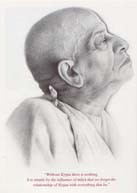
SRILA PRABHUPADA'S QUOTE OF THE DAY
My other godbrothers they are concerned with litigations, politics,
and diplomacy, so what is the pracara? As far as I am concerned I
have the blessings of my guru maharaj. I do not need anything else.
That is how I went to your country, just to try to carry out his
order. By his blessings it has come out successful.
Letter to Subala 1974
Sign-up to receive these quote HERE:
mailto:haribol@pacific.net.sg

Bhaktivedanta Vedabase Network ...
http://vedabase.net/


The Scientific - Mathematical
Proof for God's existence:
http://geocities.com/sector114
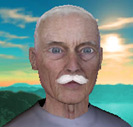
http://robot-hosting.com/php/login_nicholas.html
user name = guest
password = guest
(Collection of philosophical and mathematical proofs
for existence of God can be found in this site.)

Scientifically Philosophical Books for the layman
 ...
... ...
...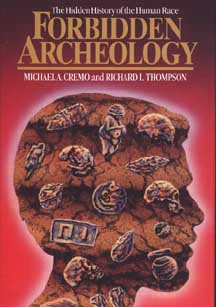 ...
...
Click on any of these books to read more about them and where to get
a copy
or contact your local temple for purchases
sample of Life
comes from Life HERE.pdf

Lotus Imprints - Preserving Prabhupada's Legacy - The
Publishing House of Hari Sauri dasa
http://www.lotusimprints.com/

Quotes from Shastra - scriptures
View using Balaram font
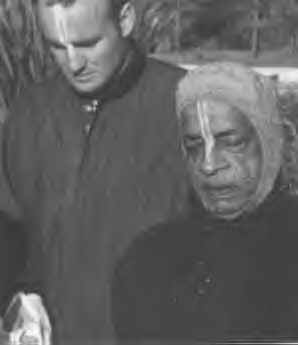
Jayananda dasa Thakur with his Spiritual Master Srila A.C. Bhaktivedanta
Swami Prabhupada.
 The
Jayananda Web-site:
The
Jayananda Web-site:
 Rememberences
of Jayananda:
Rememberences
of Jayananda:
 Memories
of Jayananda Thakur:
Memories
of Jayananda Thakur:
 Sriman
Jayananda Thakur, Bhakti Exemplified:
Sriman
Jayananda Thakur, Bhakti Exemplified:
 The
beautiful life of Jayananda Thakur more excerpts from book being edited:
The
beautiful life of Jayananda Thakur more excerpts from book being edited:
 Quotes
from Srila Prabhupada about Jayananda:
Quotes
from Srila Prabhupada about Jayananda:
 Jayananda
- The First ISKCON Saint:
Jayananda
- The First ISKCON Saint:
 More
Nectar on Jayananda prabhu - see link to his Astrological chart:
More
Nectar on Jayananda prabhu - see link to his Astrological chart:
 Rathyatra
pages:
Rathyatra
pages:
 Srila
A.C. Bhaktivedanta Swami Prabhupada's pages:
Srila
A.C. Bhaktivedanta Swami Prabhupada's pages:
The test of a theory is in its implementation. While one can spend
a lot of time analyzing the process of bhakti, faith readily comes when
one sees the theory in action. Jayananda Prabhu is such a devotee who exemplified
in an almost classical manner the process of bhakti from inception to completion.
When he left his body on May 1, 1977, Srila Prabhupada instructed that
his disappearance day should be celebrated as that of a great Vaisnava.
Observing the pastimes of such devotees greatly reaffirms one's faith in
the process of bhakti.
The background
**************
Jim Kohr was the all-American boy. Handsome, strong, intelligent
born in an upper middle-class family. A good student, he took a degree
in mechanical engineering from Ohio State University. However despite his
outward trappings of success, he was often unhappy, empty and dissatisfied
with the material conception of life. Jim did not fit into the upper class
crowd, so it was not very surprising that he ended up driving cabs in San
Francisco. Though an introspective person, he was not really religious.
His depression was almost suicidal when in 1967 he happened to read a small
article in the San Francisco paper about an Indian Swami who had come to
the Bay area to propagate the chanting of the names of God. For some reason
the article ignited a ray of hope within him. He resolved to attend the
lecture of the Indian Swami.
In the Bhagavad Gita (7.16), Krishna says, 'four kinds of pious
men begin to render devotional service unto Me -- the distressed, the desirer
of wealth, the inquisitive, and he who is searching for knowledge of the
Absolute.' Jim was searching for answers from the material miseries, and
in such a mood took his first step towards his destiny.
The beginnings
**************
Jim was instantly attracted to the Indian Swami, who was none
other than Srila Prabhupada, the founder acarya of ISKCON. He had been
in the U.S.A for only a year and was in the process of establishing his
mission of bringing Krishna consciousness to the Western world. Jim began
to regularly attend the morning Bhagvatam lectures of Srila Prabhupada.
On some occasions Jim would be the only guest listening to the morning
lecture. Soon he became very attached to Srila Prabhupada and his teachings.
Prabhupada lovingly reciprocated and would sometimes personally cook prasadam
for Jim and serve him. Soon thereafter Srila Prabhupada accepted Jim as
his disciple and initiated him with the spiritual name Jayananda.
In Cc Madhya 19.151 Caitnaya Mahaprabhu says that '. out of many
millions of wandering living entities, one who is very fortunate gets an
opportunity to associate with a bona fide spiritual master by the grace
of Krishna. By the mercy of both Krishna and the spiritual master, such
a person receives the seed of the creeper of devotional service.' In this
way Jayananda received the seed of devotion, out of the causeless mercy
of Srila Prabhupada. From the instructions and teaching presented by Srila
Prabhupada, he understood his special relationship with Krishna, with Guru,
and that there is an authorized process to establish this relationship.
Attraction to Krishna consciousness
***********************************
Jayananda was completely enamored by Krishna consciousness. He
would rise every day morning before four, do a little arati, chant his
rounds of japa, read and cook prasad. Then he would go for his 'incense
run' (selling incense sticks). He never deviated from this, he was completely
happy as long as he was practicing Krishna consciousness.
Jayananda worshipped prasadam. When a little prasadam spilled
on the floor he would lick it up. He loved to cook, eat, offer and distribute
prasadam in a big way. He even said 'prasadam' with so much love and devotion
that it made one immediately want to take some.
Another example of his attachment to Krishna consciousness was
his love for the holy name. He was always seen chanting and dancing enthusiastically
during kirtans. One day after working hard for ten hours straight, when
all the other devotees were looking forward to some rest, Jayananda enthusiastically
bounced into the temple room for kirtan. His japa was very intense, very
focussed, as he strove to personally associate with each and every syllable
of the mahamantra.
In Bhakti-rasamrta sindhu, Srila Rupa Goswami mentions that the
process of sadhna bhakti begins with a little faith (sraddha). This faith
then blossoms into a desire for devotee association (sadhu-sanga) and then
into bhajan-kriya (devotional service).
Similarly, Jayananda, after receiving the association of Srila
Prabhupada and other devotees at the temple began to execute devotional
service as per the instructions he received from his spiritual master.
As he executed his sadhna sincerely, he became purified of the material
impediments to devotional service(anartha-nivrttih) and began to manifest
the all-attractive qualities of a pure devotee.
Humility
********
Humility was certainly Jayananda's most prominent quality. He
treated everyone as his superior, even new devotees. Although his service
was glorious, he never wanted any glory. He avoided praise like the plague.
Devotees got to know that if they wanted to keep Jayananda's association
they would better not praise him. His humility was very natural and he
always found something other than himself that was praiseworthy. Even though
he was a senior devotee, older than most of the people around him and eminently
qualified, he was happy to simply serve.
Once a new boy at the temple wanted to do some service and was
asked to help with the trash. The weekly trash run was done by Jayananda,
who cheerfully took the little help the boy gave. Later when the boy became
a devotee, he remembered thinking, 'If the garbage men at this temple can
be so blissful, just imagine what the rest of the devotees are like!'
Caitanya Mahaprabhu, in the third verse of Siksastakam lays down
the qualification for offenseless chanting. 'One can chant the holy name
of the Lord in a humble state of mind, thinking himself lower than the
straw in the street. One should be more tolerant than the tree, devoid
of all sense of false prestige and ready to offer all respects to others.
In such a state of mind one can chant the holy name of the Lord constantly.'
Jayananda exemplified this verse. He was so humble that just being in his
association would make one feel ashamed of one's pride. He was very special,
yet no one paid any special attention to him. That was just the way he
liked things.
Service attitude
****************
Jayananda was an expert at everything: cooking, preaching, Deity
worship, public relations, sankirtan, selling incense, construction, and
anything that it took to spread Krishna consciousness. He was a tireless
worker, first to rise in the morning and last to sleep at night. He was
always running out to get flowers, washing dishes, cleaning the kitchen
or taking out the trash. Whatever service he was given, he would make sure
that it was done, no matter how busy he was or how much personal hardships
he had to endure for it. No matter how hard he was working, he would never
stop for a nap during the day. He seemed inexhaustible.
Many times when Jayananda went to Berkley to distribute leftover
prasadam, he would first organize a crew to clean the kitchen, working
twice as hard as anybody else, then he would transfer the prasadam, load
it into the van, drive it to Berkley, organize the distribution there and
have kirtan while all this was going on. Many years later he readily accepted
the position of the driver for the Radha Damodar travelling sankirtan party,
working side by side with brahmacharis scarcely half his age. In spite
of his advanced position and seniority he never asked for anything special
and readily accepted menial position under new devotees.
In the Vishnu purana, Sri Krishna informs Arjuna that 'one who
claims to be My devotee is actually not My devotee. One who claims to be
the devotee of my devotees is in actuality My devotee'. Jayananda completely
manifested this quality. He was always striving to be the 'dasanudasa',
the servant-of-the-servant. But there was no artificial humility in him.
Material humility is relative, it is predicated on the qualifications of
the recipients. Jayananda had spiritual humility, it was absolute, without
any consideration of the status or qualities of the recipient. He served
every one and expected no one to serve him.
The process of remembering, discussing or enumerating the qualities
and pastimes of the Lord and His devotees is very purifying. This week
we continue the discussion of the qualities of Jayananda Prabhu, who in
the relatively short time he was associated with Krishna consciousness,
perfected his devotional service and left us many instructions by example.
Freedom from fault finding
**************************
Perhaps the most defining characteristic of Jayananda was that
he never criticized anyone. Even if a devotee did something that warranted
criticism, he would usually not say anything, or else make the mistake
appear as something perfectly natural. He never spoke harsh words or chastised
anybody. Sometimes devotees would come to him with expansive ideas of how
to spread Krishna consciousness. Jayananda would encourage these ideas,
however extraordinary. At the same time he was not a fool. He could always
pick up the right man for the job.
In the Nectar of Instruction (Verse 5), Srila Rupa Goswami says,
'one should associate with and faithfully serve that pure devotee who is
advanced in undeviated devotional service and whose heart is completely
devoid of the propensity to criticize others.' Jayananda could not even
bear to hear the criticism of another devotee. If such a thing were happening
he would simply leave the room. These are the characteristics of an uttama-adhikari,
one who has reached the highest level of perfection in his sadhana bhakti.
Dear to everyone
****************
Like the six Goswamis, Jayananda was dear to both the gentle
and the ruffians. He was as much at home with the Italians at the produce
market as he was with the Brahmacharis at the temple. Once a devotee was
approached by a staggering drunk in San Francisco, who looked at his robes
and asked, 'Hey, where is my old friend Jayananda?'
Many devotees who took over Jayananda's old territory would meet
people who would say things like, 'Where is Johnny Ananda?' or 'That man
- he's the nicest and most pure man I've met' or 'I don't know much about
your philosophy, but if Jayananda is into it, it must be all right.'
One woman public official on the San Francisco board was famous
for giving the devotees a hard time during Ratha-yatra. One year when the
devotees approached her, she asked, 'where is Jayananda?' On hearing that
he had passed away she broke down and began to cry. The purity in Jayananda's
heart would touch the even most cynical.
In BG 5.7, Sri Krishna says that 'One who works in devotion, who
is a pure soul, and who controls his mind and senses is dear to everyone,
and everyone is dear to him. Though always working, such a man is never
entangled.' Every one loved Jayananda, since he had completely transcended
the bodily conception. He would approach a drunk, a hippie or a devotee
with the same compassion and enthusiasm. He spoke to the Supersoul in everyone,
and everyone responded accordingly. Like Maharaja Yudhisthira, Jayananda's
enemy was never born.
Expert at engaging everyone
****************************
It is said that though Krishna has nothing to do with non-devotees,
His devotees are even more compassionate than Him and will try and engage
them in the Lord's service. Jayananda was eager to see everyone engaged
in Krishna's service. Whenever a new bhakta would come. Jayananda made
him feel he was engaged in important work. He was older, bigger and stronger
than just about anyone in the temple, and everyone was glad to be working
under him.
His preaching style was very simple and direct. He would speak
from the heart to the heart. Once he was preaching to a couple of hippies,
while crawled under an automobile. All that was visible of him was a pair
of legs, yet the two hippies stood there, transfixed by his message. During
Ratha-yatra time he would organize a crew of cynics, hippies, bloopers,
uncooperative personalities and non-devotees off the street to help build
the carts. He would get them to work for ten to fourteen hours a day, always
glorifying them.
The Cc Antya 7.11 it is stated, 'The fundamental religious system
in the Age of Kali is the chanting of the holy name of Krishna. Unless
empowered by Krishna, one cannot propagate the sankirtana movement.' Because
of the genuine compassion in Jayananda, Krishna gave Him the unique ability
to make people want to render devotional service, directly or indirectly.
Materially renounced
********************
Jayananda had almost no possessions, even during his years as
a householder. What ever he had, he used for the service of the temple
and Srila Prabhupada. When he was gifted five thousand dollars, he promptly
donated that to Srila Prabhupada. In the introduction of the Nectar of
Devotion, Srila Prabhupada acknowledges this contribution. For many years
he was almost single handedly supporting the temple by driving his cab
for 12-14 hours a day. When he was in his last days of his life, he used
the money given to him for his treatment to support the Ratha-yatra in
Los Angeles.
He was extremely careful with what he considered to be Srila Prabhupada's
money. When selling incense, he would sleep on park benches in bitter cold
rather than spend money on a motel. He used his considerable charm to get
people to donate almost every thing that was needed. What he could no get
for free, he made sure that he received a good value for the money spent.
His final lesson in material detachment came when it was discovered
that he was suffering from cancer of the lymph and blood. Jayananda continued
as if nothing had changed. When his body became frail and weak, he continued
preaching, inspiring and organizing from his bed in the hospital. For him
the body was simply a means to render devotional service to the Lord.
In Cc. Madhya 6.254 Caitanya Mahaprabhu summarizes in the phrase
'vairagya-vidya-nija-bhakti-yoga', which means 'renunciation through the
wisdom that comes from practicing devotional service.' Jayananda was a
true sannyasi, as one who did not just renounce material objects but actually
renounced the desire for these material objects. He was always eager to
use everything for the service of Krishna, however he had no personal desire
for anything material.
Jayananda: king of the Ratha-yatra
***********************************
Jayananda was the backbone of the Bay area Ratha-yatra for several
years. Behind the scene he would do everything for the preparation of the
festival. He would beg food, flowers, funds - buy materials and build the
carts. He would arrange for the permits, organize the cooking and serving
of prasad. Although things always went right down the wire, he would consistently
succeed in fulfilling all this plans every year. After the festival he
would cook a cake or a pie for each and every person who had some how helped
in the festival. Because of his efforts the Bay area devotees to this day
enjoy an amazingly harmonious relationship with the city officials.
In his last days Jayananda was busy organizing the Ratha-yatra
from the hospital bed. He would talk to people on the phone, send his associates
to meet various persons and things began to miraculously materialize. Every
moment of his life was preciously used in the service of Krishna.
Mystic opulence
*****************
It is said that pure devotional service brings about much opulence.
Thought the devotees never seek them out, once they are there, they are
used for the service of Krishna.
Jayananda apparently could function with very little or even no
sleep. Towards the last few days of the Ratha-yatra he would sleep less
than three hours a day, yet he was the most energetic and enlivened member
of the crew. His propensity to consume prasad was astounding. He could
consume buckets of halva, plates of samosas and potatoes without any side
effect. When he was in his last days, he was put on an intravenous diet,
yet he would often ask devotees to sneak in huge quantities of samosas
and cheese-potatoes for him, which he would happily consume without any
apparent distress. He would some times sleep in the Bhagavatam classes,
since he was very tired, yet later on he could perfectly quote from the
class or have a deep discussion about its contents.
In BG 4.26, Sri Krishna declares that, 'One who is engaged in
full devotional service, unfailing in all circumstances, at once transcends
the modes of material nature and thus comes to the level of Brahman.' In
the Närada-pancaratra, devotional service to the Lord is likened unto
a queen attended by her maidservants in the form of material opulences,
liberation and mysticism. Jayananda never had any hankering for these,
but when they came, he simply used them in the service of Krishna.
Special relationship with Srila Prabhupada
******************************************
Jayananda has complete faith in Srila Prabhupada. He perfected
his devotion by making the instructions of Srila Prabhupada the very core
of his life. He was advanced enough to realize that real association was
through following the instructions of the spiritual master. Unlike most
of the other devotees, who would go out of their way to get some personal
association of Srila Prabhupada, Jayananda was contend to work in the background,
carrying out his instructions. He exemplified the superiority of association
by vani (instructions) over vapu (personal association). Srila Prabhupada
would invariably call of Jayananda when he was in the temple. Jayananda
would resist saying, 'No, I cannot go. I am too dirty. I am too fallen,'
such were the transcendental exchanges between the spiritual master and
his dear disciple.
In Cc. Madhya 19.151, Caitanya Mahaprabhu says that, 'Among all
the living entities wandering throughout the universe, one who is most
fortunate comes in contact with a representative of the Supreme Personality
of Godhead and thus gets the opportunity to execute devotional service.'
Jayananda was one of these fortunate souls who came in contact with a pure
devotee of the Lord and under his guidance was able to perfect his devotional
life.
Conclusion
**********
Jayananda passed away on May 1, 1977. He joined the Krishna consciousness
movement in 1967, just when it is in its beginning, and left the planet
a few months before Srila Prabhupada. In the scriptures it is said that
when the pure devotees of the Lord appear to execute His will, their associates
invariably accompany them. One cannot help but speculate that Jayananda
had only come to serve his eternal spiritual master. The fact that Srila
Prabhupada was on this planet at the time of his passing away is also significant.
It let Srila Prabhupada affirm that 'every one should follow the example
of Jayananda.'
We offer our most humble obeisances to Sri Srimad Jayananda Prabhu,
the exemplary teacher of devotional service in Krishna consciousness.
The Appearance Day of Lord Narasimhadeva
Nrisimha Chaturdasi
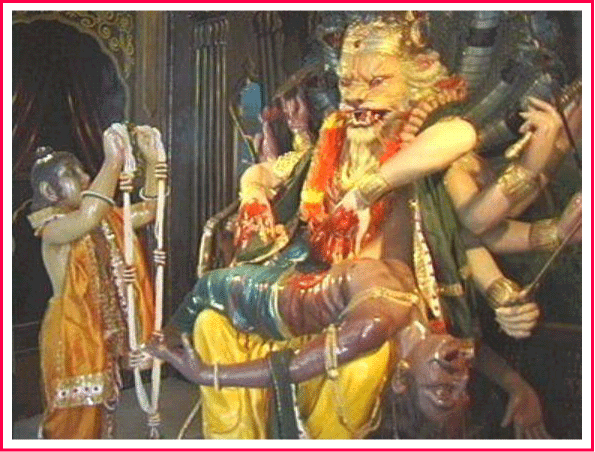
last updated 13th May 2006
Lord Nrsimhadeva's Appearance
Day - by Srila A.C.Bhaktivedanta Swami Prabhupada
Prayer to Nrisimhadeva from Dasavatara
Storam of Jayadev Goswami:
The Nrisimha story
Nrsimha
Bija mantra - ugram bhiram maha-vishnum.......
Nrsimha
prayers - namaste narasimhaya.......
Narasimha
mahamantra
Pictures of the Narasimha
and other avataras:
Mantras to Lord Narasimha
More mantras and prayers
to Lord Narasimha
Nrisimha Kavacha - shield:
of both Brahma and Prahlad maharaj:
108 Names of Narasimha
for yajas - homa - havan
1000
Names of Nrsimhadev, collected by Kushkratha dasa
Sri Narasimha
Nakha Stuti:
Sri Nrisimha Stuti:
Ahobilam Stotram
Ugra-Nrsimha-Dhyana
- meditation
Nrsimha prayers .pdf - download
Nrisimha Chaturdasi
puja:
Simple Tadiya Narasimha
puja:
Nrsimha Chaturdasi 2006
by HH Guru Prasad Swami
For more information on the Narasimha Avatara of Vishnu:
http://narasimha.avatara.org/
The Glories of the Nrsimhadev
Shalagram Sila and rendering service to Him:
Sri Shaligram Tirtha
Pradarshini site - where there are sooooooooooooo many Silas:
Various
prayers to Lord Narasimha by Swami Desika Vadagalite Sri Sampradaya,
Swami of Ahobalam Mutt, etc MP3 files
To view the text on this
page you will need the Balaram font Downloadable
 Prayer
to Lord Nrsimha
Prayer
to Lord Nrsimha
 (from
Sri
Dasavatara-stotra, p. 97)
(from
Sri
Dasavatara-stotra, p. 97)
tava kara-kamala-vare
nakham adbhuta-srngam
dalita-hiranyakasipu-tanu-bhrngam
keshava dhrta-narahari-rupa
jaya jagadisa hare
"O Keshava! O Lord of the
universe! O Lord Hari, who have assumed the form of
half-man, half-lion! All
glories to You! Just as one can easily crush a wasp
between one's fingernails,
so in the same way the body of the wasp like demon
Hiranyakashipu has been
ripped apart by the wonderful pointed nails on Your
beautiful lotus hands."
"The fourth incarnation is Nåsiàhadeva.
Nåsiàhadeva appeared to save Prahläda Mahäräja,
who was five-years-old boy and he was being tortured by his atheistic father.
So He appeared from the pillar of the palace as a half-man, half-lion.
Because this Hiraëyakaçipu took benediction from Brahmä
that he’ll not be killed by any man or any animal. So the Lord appeared
neither man nor animal. This is the difference between the Lord’s intelligence
and our intelligence. We are thinking that we can cheat the Lord by our
intelligence, but the Lord is more intelligent than us. This Hiraëyakaçipu
wanted to cheat Brahmä by indirect definition. First of all he wanted
to become immortal. Brahmä said, “That is not possible because even
I am not immortal. Nobody in this material world is immortal. That is not
possible.” So Hiraëyakaçipu, the demon... The demons are very
intelligent. He thought that “Round about way I shall become immortal.”
He prayed to Brahmä that “Please give me the benediction that I shall
not be killed by any man or any animal.” Brahmä said, “Yes, that is
all right.” “I shall not be killed in the sky, on the water or on land.”
Brahmä said, “Oh yes.” “I shall not be killed by any man-made weapons.”
“That’s all right.” In this way he utilized his intelligence in so many
ways just to come to the conclusion of being immortal. But the Lord is
so cunning that He kept intact all the benediction given by Brahmä,
still he was killed. He said that “I’ll not be killed either during daytime
or night.” Brahmä said “Yes.” So he was killed
just in the evening, just in the junction of day and night. You cannot
say it is day or night. He took the benediction that “I shall not be killed
in the sky, on the water, on the land.” So he was killed on His lap. He
took the benediction that “I shall not be killed by any man-made or any
God-made weapons.” That was given, “All right.” So he was killed by the
nails. In this way, all the benedictions were kept intact, still he was
killed. Similarly, we may make plan, we may make very advancement in scientific
knowledge, but the killing process of nature will be there. Nobody can
escape. By our intelligence we cannot escape. The four principles of material
existence means birth, death, old age and disease. We can manufacture many
medicines, many weapons, many means, many methods, but you cannot escape
these four principles of material existence, however great you may be.
That was proved by Hiraëyakaçipu. Hiraëyakaçipu
was one of the stalwart materialistic and he wanted to live forever, enjoy,
but he also could not live. Everything was finished" (A.C. Bhaktivedanta
Swami Prabhupada. 18th February 1970. Class on Sri Varaha-dwadasi purporting
the Dasavatar-stotra - Ten main incarnations of the Lor. Los Angeles.)

Lord Nåsiàhadeva’s Appearance
Day
Srila A.C. Bhaktivedanta Swami Prabhupada. Çrémad-Bhägavatam
7.5.22-34. Los Angeles, May 27, 1972,
720527SB.LA
Prabhupäda: So today, appearance day
of Lord Nåsiàhadeva. Lord Nåsiàhadeva appeared
on this Nåsiàha Cäturdaçé on account of
His devotee, Prahläda. As it is stated in the Bhagavad-gétä,
yadä yadä hi dharmasya glänir bhavati bhärata, abhyutthänam
adharmasya [Bg. 4.7]. Pariträëäya sädhünäà
vinäçäya ca duñkåtäà, sambhavämi
yuge yuge [Bg. 4.8]. The Lord appears with two purposes. Pariträëäya
sädhünäm: just to give protection and rescue the devotees,
and to kill the demons, vinäçäya ca duñkåtäm.
So Prahläda Mahäräja, five-years-old boy, his only fault
was that he was Kåñëa conscious. He was devotee of Kåñëa.
That was his only fault. And the father was so unkind to a child, even
five years old. He could not excuse, “Oh, let this boy do whatever, chanting
Hare Kåñëa.” No. The demons are so much against God consciousness
that even at his home he would not allow his own child to become God conscious.
This is demoniac civili... So you’ll find many critics, many enemies, because
you are making progress in Kåñëa consciousness. So the
demons are always against this Kåñëa consciousness movement.
That is the whole history. Just like Lord Jesus Christ, he was crucified.
What was his fault? He was preaching God consciousness, that’s all. This
society is so cruel. So Prahläda Mahäräja was tortured in
so many ways. The torturing methods, I think you will find as you will
see in today’s picture, how Prahläda Mahäräja was tortured.
So one day, Hiraëyakaçipu... After
all, he was his son. Affection was there. So one day, Hiraëyakaçipu
asked the boy,
prahrädänücyatäà täta
svadhétaà kiïcid uttamaà
kälenaitävatäyuñman
yad açikñäd guror bhavän
[SB 7.5.22]
So he asked his son, “My dear son, what you have
learned? The best thing, what you have learned from your teachers, so you
kindly let me know.” So Prahläda Mahäräja informed that
“I have learned like this.” What is that?
çravaëaà kértanaà
viñëoù
smaraëaà päda-sevanam
arcanaà vandanaà däsyaà
sakhyam ätma-nivedanam
iti puàsärpitä viñëau
bhaktiç cen nava-lakñaëä
kriyeta bhagavaty addhä
tan manye ’dhétam uttamam
[SB 7.5.23-24]
Tan manye ’dhétam uttamam: one who is engaged
in the matter of hearing about Viñëu, çravaëaà
kértanamviñëoù. We are engaged in hearing and
talking and chanting about so many things non-Viñëu. Just like
you’ll find thousands of, millions of different types of magazines sold
in your country, in all countries. Some of the magazines are sex literature,
some cinema literature, some this literature, that... So many different
types. There is one paper I have seen, “Diabetes Literature.” There are
many patients of diabetes, so they have formed a society, “Diabetic Society.”
I have seen it. (laughter) And there are many diabetic patients, they are
being hoaxed, that “You pay two dollars per year, and you get all information
how to protect yourself from diabetes disease.” So in America two dollars
is nothing, but it is collecting millions and millions of dollars, Diabetic
Society. Diabetic magazine. So that sort of hearing and chanting is not
needed. We are not interested in all these magazines, because we are followers
of Prahläda Mahäräja. He’s our äcärya. He’s guru.
Prahläda Mahäräja’s guru is Närada, and Närada
is also our guru. Närada is guru of Vyäsadeva. So we are a branch,
but the original guru is Närada, Brahma-sampradäya. So Prahläda
Mahäräja is also a disciple of Närada Muni.
So he teaches that çravaëaà
kértanaà viñëoù [SB 7.5.23]. We have to
hear and talk and chant about Viñëu. Çravaëaà
kértanaà viñëoù smaraëaà päda-sevanam.
To remember Him always, to worship His lotus feet, päda-sevanam. Arcanam,
temple worship, to keep the Deity nicely worshiped, offer foodstuff, ärati,
this is called arcanaà. Vandanam, offering prayers. Just like we
offer prayer, govindam ädi-puruñaà tam ahaà bhajämi
**. These are prayers. There are so many prayers. Keçava-dhåta
buddha-çaréra, keñava-dhåta narahari-rüpa.
These are all prayers. This is also part of devotional service.
çravaëaà kértanaà
viñëoù
smaraëaà päda-sevanam
arcanaà vandanaà däsyaà
sakhyam...
[SB 7.5.23]
Arcanaà vandanaà däsyam. To
be always in service of the Lord, däsyaà; sakhyam, to make
friendship with Him, to consider Kåñëa as your friend.
He says... Even if I do not say that He’s my friend, He says, “I am friend
of everyone.” Suhådaà sarva-bhütänäm [Bg. 5.29].
He’s friend of everyone. We don’t want His friendship, but He wants our
friendship. He wants us to go back to home, Godhead; we don’t want. So
He is more anxious to take us, exactly like the father is more affectionate
than the son. That’s a fact. So He’s the supreme father. So He wants that
we may be happy, and therefore He comes to show us. He sends His representative,
son. He leaves behind Him books so that we may go back to home, back to
Godhead. So, sakhyam. He’s always sitting with me, within my heart. I am
in the heart, and Paramätmä is also within the heart as friend
to give me advice that “Why you are bothering in this material world? Please
come back to home, back to Me.” This is going on. Sakhyam ätma-nivedanam.
Ätma-nivedanam means fully surrendered. So there are examples of devotees
who, sarvätma-nivedanam. Just like Bali Mahäräja. He gave
everything to Kåñëa, even his body, everything, whatever,
his kingdom, money, everything.
So Prahläda Mahäräja says, iti
puàsärpitä viñëau bhaktiç cen nava-lakñaëä.
All these items means hearing. Hearing about Viñëu, chanting
about Kåñëa, giving everything to Viñëu,
offering prayers to Viñëu, offering arcana, temple worship,
Viñëu. In this way Prahläda Mahäräja summarizes
that “Anyone who is doing like this, everything about Viñëu...”
iti puàsärpitä viñëau bhaktiç cen nava-lakñaëä,
“this nine kinds of different devotional services,” kriyeta bhagavatay
addhä, “directly to the Supreme Personality of Godhead,” tan manye
’dhétam uttamam, “I think he is the best learned man in the world.
He is the most learned.” Tan manye ’dhétam. “He has studied everything
very nicely.” Actually, that is the fact. Jïäna, knowledge Knowledge
means to know Kåñëa, God, and the Vedic injunction is,
yasmin vijïäte sarvam evaà vijïätaà bhavanti.
If you understand the Supreme Lord, then you understand everything. You
haven’t got to study differently different subject matters. Just like we
sometimes talk of science, of astronomy, economics, politics. We talk sometimes.
But we are not going to, or we didn’t study all the subject matter separately.
But in course of our studying Kåñëa consciousness, we
know something of everything. So Prahläda Mahäräja says,
tan manye adhétam uttamam: “One who is engaged in these nine kinds
of devotional services directly...” So Prahläda Mahäräja
recommends, kriyeta bhagavaty addhä tan manye ’dhétam uttamam.
niçamyaitat suta-vaco
hiraëyakaçipus tadä
guru-putraà cedaà ruñä
prasphuritädharaù
As soon as he heard, “Oh, what this nonsense boy
is speaking?” he became so angry that sphuritädharaù. When
one becomes angry, his lips vi..., I mean to say, jumps. What is called?
Quiver, yes. So he became so angry that it is said, sphuritädharaù.
(He) immediately called his teacher. He’s king... Because he thought, “The
rascal teachers, they have taught him like this. I have entrusted the boy
to the teachers, to brähmaëas, and they have taught this Kåñëa
consciousness. So call him. Otherwise, how is that this small boy, five
years old only, he’s talking just like a great saint? So call his teacher!”
brahma-bandho kim etat
te vipakñaà çrayatäsatä
asäraà grähito bälo
mäm anädåtya durmate
Hiraëyakaçipu became bitterest enemy
of Viñëu because his brother Hiranyakña, he was killed
by Viñëu taking the shape of Varäha. You know the story.
Since then, Hiraëyakaçipu was bitterest enemy. “Oh, He has,
Viñëu has killed my brother. So He is my greatest enemy.” So
he won’t hear anything about Viñëu. Any Viñëu devotee,
he will punish him, even his own son. That was his policy. So he immediately
called him, the teachers, and addressed him,
brahma-bandho kim etat te
vipakñam çrayatäsatä
asäraà grähito bälo
mäm anädåtya durmate
So here... Teachers are generally brähmaëas.
Not generally. To become teacher is the business of the brähmaëas.
Brähmaëa means they have got six kinds of... Everyone must have
livelihood. This material world is that you must work; otherwise you cannot
get your livelihood. That is the law, whatever you may be. So the brähmaëas’
means of livelihood, six things: paöhana päöhana yajana
yäjana däna pratigraha. Paöhana means he must be a very
learned scholar, study the Vedic literature, and must teach others also.
That is brähmaëa’s business. And in that way, whatever the disciples
bring, that is his income. No salary, no contract, that “If you pay me
hundred dollars or five hundred dollars weekly, then I can teach you.”
No. There is no such contract. Teaching is free. It is the business of
a brähmaëa to give free education to everyone. Now, it is the...
Just like in our institution, I am your teacher, but there is no such contract
that you have to pay me. But you pay me more than anything. So paöhana
päöhana, that is the means of livelihood of brähmaëa.
And kñatriya, they are kings. They can levy tax of the citizens
because they are giving protection from being hurt by others. Kñatriya
means one who gives protection (to) a man being hurt by others. That is
the real root meaning. Kñatriya. And vaiçya means they should,
kåñi-gorakñya-väëijyam, they should engage
themselves in producing foodstuff, foodgrains, kåñi, protect
cows. Especially gorakñya. As the king is meant for giving protection
to the man, similarly, a vaiçya is supposed to give protection to
the cows, or they keep cows and produce milk products. They are vaiçya.
And çüdra, simply service. So these are the different types
of employment of different kinds of social order. And a king, the king
has to see that everyone is employed. Not that hundreds of people are unemployed,
and government has to give welfare, subsidy. Not like that. The king’s
duty is that everyone is independently earning his livelihood. That is
king’s duty.
So here the teachers are addressed here brahma-bandho.
Brahma-bandho means a person who is born by a brähmaëa father
but is not acting as a brähmaëa. He’s called brahma-bandho, dvéja-bandhu.
Dvéja-bandhu, one who is born of a, actually born of a brähmaëa
father, but he’s not acting as a brähmaëa. So Hiraëyakaçipu
addressed the teachers brahma-bandho, not brähmaëa. “Because
you are untrustworthy. I gave you, I entrusted you with my son to be taught,
and you have taught him this Kåñëa consciousness. So
against my will...” He says practically, brahma-bandho kim etat te vipakñaà
çrayatäsatä: “I entrusted my child for being educated
by you, and you have instigated him to speak in favor of my enemy, Viñëu?
Viñëu is my enemy. How is that?” Asäraà grähito
bälo mäm anädåtya durmate. “This rascal boy, he does
not care for me, and he has learned this Kåñëa consciousness,
and you have taught him. How is that?”
santi hy asädhavo loke
durmaiträç chadma-veçiëaù
teñäà udety aghaà käle
rogaù pätakinäm iva
“So I think these demigods who are followers of
Viñëu, they are coming in disguise and poisoning my son by
teaching Kåñëa consciousness, and you did not take care
of him. So what is this?”
Then the teachers replied,
na mat-praëétaà na para-praëétaà
suto vadaty eña tavendra-çatro
naisargikéyaà matir asya räjan
niyaccha manyuà kad adäù sma
mä naù
They said, “My dear King, don’t think we have taught
him like this. It is not... I know, it is not our duty to teach him against
your will. But his Kåñëa consciousness is not due to
our teaching; neither somebody is coming in disguise and teaching him.”
Na mat-praëétaà na para-praëétam. “He is
neither taught by us, nor by anyone else.” Suto vadaty eña tavendra-çatro.
Indra-çatro. The enemy... The Hiraëyakaçipu is the enemy
of the demigods; therefore he is addressed as Indra-çatro. As he
addressed the brähmaëa, brahma-bandho, so they retaliated also,
that “You are enemy of the demigods.” Naisargikéyam, “By nature
he is doing that. We try to forbid him. We try to stop him chanting Hare
Kåñëa, but still he’s doing.” Matir asya räjan niyaccha
manyuà kad adäù sma mä. “You don’t be angry upon
us. We never did it.” So... “He is, by his own nature he chants, he preaches,
he’s doing all this.”
guruëaivaà pratiprokto
bhüya ähäsuraù sutaà
na ced guru-mukhéyaà te
kuto ’bhadräsaté matiù
Then he again asked his son, “Now I understand
that your teacher has not taught you all these things. You rascal, where
you have learned all this Kåñëa consciousness?” (laughter)
Abhadra. Kuto abhadräsaté matiù: “Wherefrom you got
this rascal wisdom? Tell me.” So this is the position, you see. Even father
becomes enemy.
Now, Prahläda Mahäräja is replying.
Prahläda Mahäräja is replying,
matir na kåñëe parataù
svato vä
mitho ’bhipadyeta gåha-vratänäm
adänta-gobhir viçatäà
tamisraà
punaù punaç carvita-carvaëänäm
[SB 7.5.30]
“My dear father, don’t be afraid. It is not a thing
to be taught.” Matir na kåñëe. “Nobody can become Kåñëa
conscious,” matir na kåñëe parato, “being taught by others,”
matir na kåñëe parataù svato vä, “or by mental
speculation or thinking oneself,” mitho ’bhipadyeta, “or by making conference
meeting, religious meeting, conference.” No. Three things. One thing is
to learn Kåñëa consciousness by speculative method, self-realization.
Just like so many people are very much interested that “Why shall I go
to a guru? I can realize myself. I shall meditate.” So that is called svataù.
And parataù means by others’ instruction. And mitho, mitho means
by assembly. So who? Now, gåha-vratänäm. If one is gåha-vratä...
There are two things: gåhastha and gåha-vratä, or gåhamedhi.
“So those who are gåha-vratä...” because he is pointing out
his father’s position, that he’s gåha-vratä. He has no other
business. He simply wants to get money, hiraëya. Hiraëya means
gold, and kaçipu, a nice apartment. That’s all. So he says that
gåha-vratänäm, “If one makes it his point to remain in
a comfortable home life, for him, either by speculation or by teaching
or by meeting, he’ll never develop Kåñëa consciousness.”
Gåha-vratänäm. Then what is their position? Now, adänta-gobhir
viçatäà tamiñram: “They are unable to control
their senses, and as such, they are entering into the darkest region of
material existence.” Punaù punaç carvita-carvaëänäm:
[SB 7.5.30] “Their only business is chewing the chewed.” They have no other
ways. Gåha-vratänäm, those who want to be happy materially,
actually they are chewing the chewed. Material happiness means sex life,
ultimate, utmost, topmost happiness. So people are simply trying to, how
to utilize this sex life in so many ways, in pictures and in... I do not
wish to discuss. In dancing, in club, in so many ways. Because they cannot
control the senses. The same thing, same thing, the same sex life in different
way. Sometimes a naked dance, sometimes in this way, sometimes in that
way. Therefore it is called punaù punaç carvita-carvaëänäm
[SB 7.5.30]. I have heard that some people go to Florida and they spend
fifty thousand dollars per week for organizing naked dance. So naked woman
he has seen so many times, but still he spends more money to see it in
a different way. That is called punaù punaç carvita-carvaëänäm
[SB 7.5.30], “chewing the chewed.”
So persons who are too much attached to sense
gratification, and they have made it their conclusion that “We shall be
happy within our family life or this social life...” Vidyäpati sings,
tätala saikate väri-bindu sama suto-mita-ramané-samäj(?).
Our society means... Society, friendship, and love. There must be woman,
must be children, suto-mita-ramané-samäje. So there is some
pleasure, undoubtedly. Otherwise, why people are working so hard to stick
to this position? Vidyäpati sings that tätala saikate väri-bindu
sama suto-mita-ramané-samäj(?). There is undoubtedly some pleasure,
but that pleasure is so insignificant that it can be compared: a drop of
water on the desert. Desert, if you want to utilize desert to make it a
garden or productive field, you have to pour water. The whole ocean water
you have to pour there. Now, if somebody says, “All right, you want water.
Now take this one drop water,” then what it will do? Similarly, our heart
is hankering after so many things. We are hankering... Actually we are
hankering after Kåñëa, but we do not know. We are trying
to satisfy our hankering in so many ways in material life. Actually we
are hankering after Kåñëa. Just like a small child, it
is crying. It cannot express, but it is wanting the mother’s breast feeding.
So you cannot stop him crying unless it is transferred to the mother. Similarly,
actually we love Kåñëa. That is a fact. Because we love
Kåñëa... Therefore you, who did not hear even the name
of Kåñëa, say, four or five years ago, why you after
so much Kåñëa? This is the proof, that actually we are
after Kåñëa. This Kåñëa consciousness
movement is being accepted in Western countries by the younger generation.
Why? Because every one of us, we love Kåñëa. But it is
now covered by mäyä. We have to simply take out the covering,
mäyä; then we are Kåñëa conscious.
That is explained in the Caitanya-caritämåta,
nitya-siddha kåñëa-bhakti ‘sädhya’
kabhu naya
çravaëädi-çuddha-citte
karaye udaya
That Kåñëa consciousness is not
an artificial thing, that we are making some propaganda on Kåñëa
consciousness, publishing some books, magazines, and our preachers are
going place to place. No, there are so many propaganda is going on. But
they are not so effective. And our, what means we have got to make propaganda?
We simply make this propaganda, “Please chant Hare Kåñëa.”
That’s all. Of course, we do sincerely. So if we propagate sincerely and
seriously, as Caitanya Mahäprabhu has ordered, yäre dekha, täre
kaha ‘kåñëa’ upadeça... [Cc. Madhya 7.128]. We
must be sincere. Then, if we canvass, “Please chant Hare Kåñëa,”
it will be effective. It will be effective. The business is not very serious
or very difficult. Caitanya Mahäprabhu says, yäre dekha, täre
kaha ‘kåñëa’... “Anyone you meet, you simply request
him about hearing about Kåñëa.” So... But if one is so
much covered by materialistic enjoyment, it takes little time. It takes
little time. Otherwise, automatically there is love for Kåñëa,
and çravaëädi-çuddha-citte...
Therefore Prahläda Mahäräja says,
çravaëam. If we hear about Kåñëa constantly,
through realized souls, not professional—if we hear, satäà
prasaìgän mama vérya-saàvido [SB 3.25.25]—then
automatically, our dormant Kåñëa consciousness come out.
So Prahläda Mahäräja says, therefore, that “Those who are
determined to become happy within this material world, they cannot be raised
to Kåñëa consciousness either by personal teaching or
by making conference or by mental speculation.” That is not possible, because
he is determined. So our duty is that we should know that in the materialistic
way of life we shall never be happy. This is called knowledge. And vairägya.
So this vairägya and knowledge is not so easy. Prahläda Mahäräja
says, adänta-gobhir viçatäà tamisram: it is not
possible. That means he assures his father, “Don’t be worried. You will
never be Kåñëa conscious. (laughter) Because your only
aim is to stick to home and money and women. Therefore rest assured, you’ll
not be ... It is not that a person like you will be raised to Kåñëa
consciousness.” Then? How you have done? The next question should be: Why
they are sticking to this materialistic way of life?
That is answered by Prahläda, na te viduù
svärtha-gatià hi viñëum [SB 7.5.31]. “These persons,
those who are so much materially attached, they do not know the ultimate
goal of life is Viñëu, the Supreme Personality of Godhead,
Viñëu.” That is actually the ultimate goal of life. We are
here in this material world, forgetting Kåñëa, to enjoy,
to lord it over the material nature. Everyone is trying to become the lord,
master of material... That is struggle. Nobody can become lord or master
of this material world. But that struggle to become master, they are taking
it happiness. They are taking it happiness. That is the nature of persons
who are influenced by the modes of passion. They’ll work hard, and that
will, they will take it is very good, pleasing. Because they do not know
that the... Na te viduù svärtha-gatià hi viñëuà
duräçayä ye bahir-artha-mäninaù [SB 7.5.31].
They are hoping against hope to become happy within this material world.
That is the whole history. Take the history, any history, modern history.
There are so many empires: the Roman Empire, the Carthaginian Empire, the
Greek Empire, the British Empire recently, Hitler’s Nazism, and so many.
For some time they become very powerful. Just like Hiraëyakaçipu,
he’s now very powerful. He’s thinking, “Nobody can...” Now today he’ll
be killed. Keçava-dhåta narahari rüpa is coming. So this
demonic civilization will never be successful. That’s a fact. But they
are so fool, they do not see even historical evidences. So many empires
failed. The Roman Empire failed, the British Empire failed. Still, somebody
is trying to create another empire, another, different empire. Just like
your President Nixon, he’s trying to influence all other nations under
his control. Why? Of course, I should not speak all these things. There
may be criticism. But that is the way, going on. That is the way. We can
understand. We can understand politics, economics, everything, but we do
not bother about. But our aim is that this way of life, to increase materially
happiness, it will never be successful. That is our conclusion. We are
not fools that we have given up everything for advance in Kåñëa
consciousness. Because we know that this, this way we shall never be happy.
It is not possible.
That is explained by Prahläda Mahäräja.
These rascal people who are so much materially attached... Kåñëa
also says in the Bhagavad-gétä,
bhogaiçvarya-prasaktänäà
tayäpahåta-cetasäà
vyavasäyätmikä buddhiù
samädhau na nigacchati
[Bg. 2.44]
Those who are too much attached, bhoga, material
enjoyment, aiçvarya, material opulence ... Bhogaiçvarya-prasaktänäà
tayäpahåta-cetasäm. Persons whose heart has been misled
by this kind of civilization, they cannot take to Kåñëa
consciousness. Therefore to become too much materially opulent is a disqualification
for attaining Kåñëa consciousness. It is a disqualification.
Because they don’t care. Just like in our temple, not very rich men, they
are coming, because they (say,) “What is this nonsense, Kåñëa
consciousness? We have got everything. These boys, they haven’t got to
eat anything; therefore they are chanting Hare Kåñëa
on the street. That’s all.” They think like that. “They’re needy. All right,
they are needy. Give them some money.” That’s all. They don’t like to take
anything from us because the same business, matir na kåñëe
parataù svato vä. They’ll never understand, because their aim
is grha-vratanam. They want to be happy... Although they are seeing there
is no happiness, they never can be happy, still... This is called punaù
punaç carvita-carvanänäm [SB 7.5.30], chewing the chewed.
One, the sugarcane, is chewed by somebody. It is thrown away. And if somebody
else comes and chew it again, what juice he will have it? So punaù
punaç carvita... Na te viduù svärtha-gatià hi
viñëuà [SB 7.5.31]. Duräçayä ye duräçayä
viñaya väsé (reads Sanskrit commentary) tantraya käraëaà
te hi viñëuà na viduù. Tatra hetu svasminn eva
arthe puruñartha yeñäà teñäà
gatià grämyaà. Na tu te ’pi guru pati syät viñëu
jïäsyasi tatra bhak bahir viñaye bahavo yeñäà
te bahir arthas tann eva guru tena mantra çélaà yeñäà
te.
So one who is fixed up in this conclusion, that
“We shall become happy with this materialistic way of life,” they cannot
take to Kåñëa consciousness. And they do not know also
that our ultimate goal of life is Kåñëa, Viñëu.
Then why it is so? Now, andhä yathändhair upanéyamänäs
te ’péça-tantryäm uru-dämni baddhäù.
They have become blind. They are blind themselves, and they are also led
by blind leaders. The leaders, at the present moment, leaders, they say
that “Why you are going to church? Why you are going to temple? If you
want your bread...” Just like in Christian religion you go to church, “O
God, give us our daily bread.” But the atheist class, they are propagating,
“For bread, why you are going to church? You make industry, you make business,
and you get bread.” But actually... We were just talking that there are
so many unemployment. Our Karandhara prabhu was... No. Who was talking?
Çyämasundara. Çyämasundara said that the computer...
What is called, computer? It can do thousands of men’s business. So they
have discovered this machine. That means thousands of men will be unemployed.
That is actually happening in your country due to so many machines. Now,
take for example, formerly... You have seen the picture, Kåñëa,
Våndävana picture, Kåñëa’s father transferring
Kåñëa. They were going on bullock carts, no motorcar.
You have seen the picture. So formerly, transport was bullock carts. The
cows and the bulls, the bulls were employed for agricultural purpose, for
drawing the carts. So there was no necessity of motorcar. Now you have
got motor, motor-tractor. You don’t want the bullocks. Therefore kill them.
How you can utilize them? Therefore you must have slaughterhouse to kill
them. And as soon as you kill them, then you have to eat them. So this
is the, I mean to say, entanglement. If you kill, then you become responsible
for being killed. The subtle laws...
Therefore, without knowing our ultimate goal of
life is Viñëu, na te viduù svärtha-gatià
hi viñëum... [SB 7.5.31]. That is our interest. The human form
of life is offered by nature after so much evolutionary process. Just to
understand Viñëu, God, this is the only business. But instead
of attending our real business, we are trying to be happy in other ways.
Then you can say that “If we are engaged in real business, then how the
economic question will be solved? We have to work.” That’s all right, you
work. But work simple. Why you have invented so much botheration? Work
is there. If you have cows and if you have got land, then you till the
land, get grains, and there is milk, there is fruit, there is flower. Anywhere,
you can live peacefully. Whole economic question is solved. And because
we have forgotten, we have missed the real point, that our life is meant
for God-realization. We are simply increasing botheration. Punaù
punaç carvita. Adänta-gobhir viñatäà tamisram.
Andhä yathändhair upanéyamänäù. The leaders
are blind; we are also blind. So they are advising that “If you want to
solve your economic problem, why you are going to church? Why you are going
to temple? Come here, increase business, industry. Take loan and start
business.” That’s all. This is going on. But actually, the more we are
trying to mislead this people... Because they are thinking it is all right.
They are... That the social condition is becoming more and more grave.
That’s a fact. We are trying to solve one problem, but many other problems
are coming because we do not know what is the ultimate goal of life. Because
we are missing the real point.
Therefore Prahläda Mahäräja said,
na te viduù svärtha-gatià hi viñëuà
duräçayä ye bahir-artha-mäninaù [SB 7.5.31].
These rascals, they are thinking that by so-called economic development,
by exploiting material resources, we shall be happy. That is not possible.
The best example your country has given. You have exploited the material
resources, and other countries are also following, but where is the happiness?
Instead of happiness, there is “hippyness.” (laughter) So still, they have
no eyes to see that “Where we are going?” Adänta-gobhir viçatäà
tamisram punaù punaç carvita-carvanänäm [SB 7.5.30].
Because we cannot control our senses, we are driving, we are being pushed
towards the darkest region of material existence, very hard to leave. Darkest
region means that we are going to become animals next life. Because this
is animalistic civilization. Nature gave us the opportunity to realize
God, but God-realization is meant for human being. The human being, if
he does not realize God, he’s simply engaged in animalistic way of life—eating,
sleeping, mating—then nature will call, “All right, sir, again become animal.”
Punar müñiko bhava: “Again become a mouse.” You know this story?
Punar müñiko bhava. There is a story. There is a very nice
story. One rat, mouse, he came to a saintly person. Everyone comes to saintly
person for some blessing, you see. Real blessing they don’t want. Some
material blessing. Real blessing, Kåñëa, they don’t want.
If you give him some blessing that “You become very rich man and...” These
are all very well, this. So this mouse also came and begged the saintly
person, “Sir, I am in difficulty. If you give me some blessing?”
“What is that?”
“The cat chases after me always. I’m very unhappy.”
“So what do you want?”
“Now, if you make me a cat, then I can get relief
from this thing.”
“All right, you become cat.” So he became cat.
So after few days, again he comes. “Sir, again
I am in trouble.”
“What is that?”
“The dog is chasing me.” (laughter) Don’t laugh,
hear seriously. “Dog is chasing me.”
“All right, then, what do you want?”
“Now, make me a tiger.”
“All right, you become a tiger.”
So when he became a tiger he was staring on the
saintly person like this.
So he asked, “Why you are staring upon me? You
want to eat me?”
“Yes.”
So he again curses, punar müñiko bhava:
“Again you become mouse. Again you become mouse.”
So that is our position. We are advanced in civilization.
Now we want to kill God. So we are again going to be uncivilized, to remain
in the forest and to remain naked. Actually, they are practicing that:
nature’s way. So again they are going to be aborigines. And that is being
practiced. They are going to the forest, they remain naked. So actually,
punar müñiko bhava: “Again become mouse.” Civilized human being
means God conscious, happy life, no trouble, no enviousness, everything
happy, no hard labor. Why hard labor? Everything is there. You just employ
your little intelligence, you get sufficient food by grains, by fruits,
by flowers, milk. There is no difficulty if we remain in our own way. So
that is the difficulty, that we do not know that our ultimate goal of life
is God-realization. Then God has got all arrangement. You cannot produce
fruits and grains in factory. They are given by God. Why? That “You eat
them and be Kåñëa conscious, chant Hare Kåñëa.”
But we don’t want that. We want slaughterhouse, unnecessarily. Actually,
if you go to the store... There are so many stores. How many stores are
selling only meat? It is not possible. Ninety-nine percent fruits, vegetables,
grains you are taking, and maybe a little percentage of meat. So why you
cannot give up this little percentage? If you think that meat is very palatable,
why don’t you live on meat? Russia is also trying like that. That has become
the fashion. In Moscow, it was very difficult to find out nice grains.
With great difficulty Çyämasundara used to spend two hours
daily to secure these things.
So this is the problem. Na te viduù svärtha-gatià
hi viñëuà durañçayä ye bahir-artha
mäninaù [SB 7.5.31]. They are trying to be happy by the arrangement
of these material activities. Andhä yathändhair upanéyamänäs
te ’péça-tantryäm. They do not know that the material
nature is so strong that you cannot get out of it unless you are prepared
to suffer more and more. If you take to natural life and live peacefully
and take to Kåñëa consciousness, that is your real life.
And if you simply increase botheration and problems, then you’ll have to
suffer. That is the position of modern civilization. Actually, superficially
we see that material advancement of material science, people have got so
many machines, so many facilities. But actually, they are in trouble. Just
like I gave you one example: the computer machine. It can work for thousands
of men. So thousands of men means the thousands of men must be unemployed.
And especially in your country, they are taking advantage of this machine
because the salary is If you want to pay to the worker, a big, big salary.
So they want to save. They are taking machine, and they think they will
save money, so many workers. But the workers are becoming unemployed. The
government has to give them welfare. The government will tax. That’s all.
(laughter.) Government will not give money, welfare, from government’s
pocket. The government will increase your taxation. So you are..., you
stop payment by importing some machine, now you have to pay that money
to the government. This is called entanglement. This is a crude example.
I don’t say that you stop all this business, but the material world is
like that. You want to solve something; instead of solving, you’ll create
so many problems. This is material life. Because our life is not meant
for solving problems and creating problems. Our life is meant for understanding
God. Then everything is all right. But that you have given up.
na te viduù svärtha-gatià hi
viñëuà
duräçayä ye bahir-artha-mäninaù
andhä yathändhair upanéyamänäs
te ’péça-tantryäm uru-dämni
baddhäù
[SB 7.5.31]
They do not know that you cannot go an inch beyond
the stringent laws of material nature. That is not possible.
Then the next question is that how... People are
not interested in Kåñëa consciousness, and then, they
are misled by blind leaders. So how, what is the solution? That is Prahläda
Mahäräja saying,
naiñäà matis tävad urukramäìghrià
spåçaty anarthäpagamo yad-arthaù
mahéyasäà päda-rajo-’bhiñekaà
niñkiïcanänäà na
våëéta yävat
Therefore one has to take shelter of a pure devotee.
That is the only solution. He says, naiñäà matis tävad
urukramäìgrhim. The beginning was that “They are not interested
in Kåñëa consciousness.” Then how to become Kåñëa
conscious if that is the solution? Then Prahläda Mahäräja
says, naiñäà matis tävad: “So long one does not
approach a pure devotee,” mahéyasäà niñkiïcanänäm,
“great personalities, who has no more any material interest,” niñkiïcana,
“and takes the dust of his lotus feet on the head...” Naiñäà
matis tävad urukramäìghrim: “So long one does not approach
such personality, there is no possibility of becoming Kåñëa
conscious.” Naiñäà matis tävad urukramäìghrim.
As soon as one approaches the pure devotee and takes the dust of his lotus
feet and puts it on his head, immediately, anartha apagamaù, he’ll
be freed from all this nonsense. That means he’ll forget this idea that
“Materially we can advance.” This is the process. So we have to approach
a niñkiïcana, who has nothing to do with this material world.
His only ambition is to serve more Kåñëa. And if somebody
approaches him and takes the dust of his lotus feet, then he can understand.
Mahéyasäà päda-rajo-’bhiñekaà niñkiïcanänäà
na våëéta yävat. (aside:) Our time is over? All
right.
So in this way Prahläda Mahäräja
talked with his father, and the father became more angry. Instead of taking
the lesson ... Mürkhäya upadeça hi prakopäya na çäntaye.
If you teach lesson to a foolish person, he’ll be simply angry. He’ll not
take your lesson. How it is so? Payaù-pänaà bhujaìgänäà
kevalaà viña-vardhanam. If you keep a snake and if you want
to make friendly behavior with him, that, “My dear snake, don’t bite any
more. I’ll give you milk and banana. You eat here and stay here nicely,”
he’ll not... His poison will increase, and one day he will... There is
a story in the Hitopadeça: one day, one... The same thing. So payaù-pänaà
bhujaìgänäà kevalaà viña-vardhanam.
So these are lessons, stories. So his father, Hiranyakasipu, became more
and more angry. So one day... Because after all, son and father... The
son was simple boy. So one day he said, “Prahläda, I shall now kill
you. I shall see how your Kåñëa saves you.” So immediately,
Prahläda was seeing to the pillars of the hall. He was king. So Hiraëyakaçipu
asked him, “Is your God, Kåñëa, in the pillar?” He said,
“Yes, sir. Yes, my father, He is there.” So immediately, with anger he
broke the pillar and Nåsiàhadeva came out.
Now we can honor Him. (end)
(Srila A.C. Bhaktivedanta Swami Prabhupada.
Çrémad-Bhägavatam 7.5.22-34. Los Angeles, May 27, 1972.
)
http://www.vedabase.com/

Srila Rupa Goswami mentions some of the benefits of worshipping
a Nrsimha shalagram sila in his book, Padyavali:
"A tulasi leaf offered to the lotus feet of the Nrsimha
shalagram sila destroys the sin of murder. Water that has washed the lotus
feet of the Nrsimha shalagram sila destroys the sin of theft. Foodstuff
offered to the Nrsimha shalagram sila destroys the sin of drinking liquor.
Sincere surrender to the Nrsimha shalagram sila destroys the sin of adultery
with the wife of the spiritual master. Association with the devotees of
the Nrsimha shalagram sila destroys the sin of offenses to the devotees.
This is the extraordinary glory of the Nrsimha shalagram sila."
[ Srila Rupa Goswami: Padyavali, Verse 116]
Visit our Shalagram site HERE

For more information on the Narasimha Avatara of Vishnu:
http://narasimha.avatara.org/
Pictures of the Narasimha
and other avataras:
Mantras to Lord Narasimha
Nrisimha Kavacha - shield:
of both Brahma and Prahlad maharaj:
108 Names of Narasimha
for yajas - homa - havan
Sri Narasimha
Nakha Stuti:
The Nrisimha story


Courtesy of http://www.vedabase.com/
used
with permission









![]()
![]()
![]()
![]()
![]()

![]()
![]()
![]()
![]()

![]()
![]()
![]()
![]()
















 The
Jayananda Web-site:
The
Jayananda Web-site:


